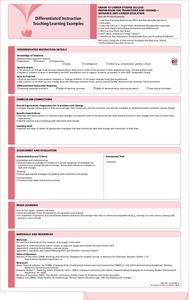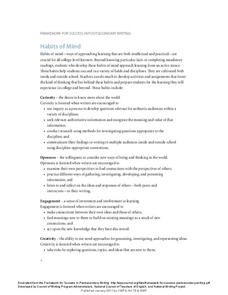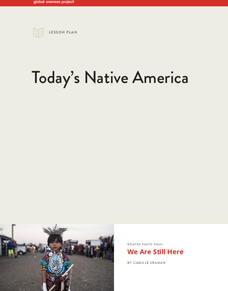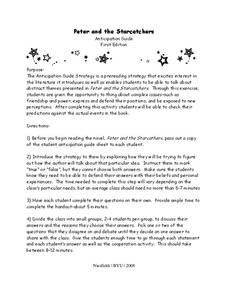Museum of Disability
Don't Call Me Special
Introduce young learners to the idea of disabilities and making friends with children who are different than they are. Using Don't Call Me Special - A First Look at Disability by Pat Thomas, learners are guided through the new vocabulary...
Museum of Disability
Buddy, The First Seeing Eye Dog
Learn about how the seeing eye dog program began with a reading lesson plan about Eva Moore's chapter book, Buddy, The First Seeing Eye Dog. With vocabulary words, discussion questions, and extension resources, the lesson plan is a...
Facing History and Ourselves
How Should We Remember?
We must remember the past in order to avoid its mistakes. Young historians analyze the importance of historical remembrance using primary and secondary documents, as well as video clips. They then study the creation of a World War II...
Curated OER
The Metamorphosis During Reading Activity: Problematic Situation
Imagine waking up to find a giant bug staring back at you in the mirror! Think about the plight of Franz Kafka's Gregor in The Metamorphosis with a group discussion activity. Class members reflect on what it would be like to suddenly...
EduGAINs
Preparation for Transitions and Change— Guidance and Career Education
Every hopeful in your class has gone through some kind of life change, from parents' divorce to a death in the family to moving up into another grade. Encourage them to discuss these changes, the skills they used and acquired during...
PBS
Facts vs. Opinions vs. Informed Opinions and their Role in Journalism
Do reporters write about what they see, or what they think? Examine the differences between investigative writing and opinion writing with a lesson from PBS. Learners look over different examples of each kind of reporting, and convince...
Oregon Department of Education
Habits of Mind
There is more than one way to approach a problem. Explore the habits of mind as they relate to the methods of approaching learning, and to how young writers can develop success once they learn to foster each skill.
Center for Civic Education
What Basic Ideas Are in the Preamble to the Constitution?
Introduce young historians to the US Constitution with this upper-elementary social studies lesson plan. Beginning with a general discussion about the role of government in society, students go on to work in small groups identifying and...
Curated OER
Project-Based Learning and the Arts
What's so great about Project-Based learning? Read to learn how projects can help kids apply higher-order thinking skills, conduct thoughtful investigations, and make cross curricular connections. This short article includes five...
Curated OER
The Adventures of Huckleberry Finn: Problematic Situation
Individuals read a series of passages from The Adventures of Huckleberry Finn, rank the statements from the least to the most racist or stereotypical, and share their rankings and rationales in small groups before a whole class...
One Pot Learning
Reading Comprehension Worksheet
Three annotated passages from Ralph Waldo Emerson's essay on "Nature" provide young philosophers a chance to improve their reading comprehension skills as they gain insight into Emerson's ideas.
Turabian Teacher Collaborative
Parts of Argument II: Article Critique
Break down the parts of argumentative writing with a critical thinking activity. High schoolers read an article of your (or their choice), and use a graphic organizer to delineate the ways the author structures his or her arguments.
Facing History and Ourselves
Do You Take the Oath?
Why did so many go along with Nazi policies during World War II? An investigatory unit includes four handouts, reading analyses, classroom discussion topics, and intriguing philosophical questions, helping learners understand the...
Health Smart Virginia
Sporting Behavior
Six small groups perform skits that showcase positive sporting behavior. Actors highlight how players try their best, encourage others, win gracefully, think positively, show respect, and resolve conflict. A class discussion and an Exit...
Global Oneness Project
Today’s Native America
The 2016-2017 protests over the Dakota Access Pipeline (DAPL) motivated Camille Seaman to create "We Are Still Here," a photo essay featuring portraits of contemporary Native Americans who protested the pipeline. This eight-page packet,...
Curated OER
Cartoons for the Classroom: Sarcasm, Irony, and Satire
Satire, sarcasm, or irony? Editorial cartoons have long been the tool artists use to express their opinions about politics and politicians. Kevin "Kai" Kallaugher's four-panel cartoon offers readers an opportunity to examine how he uses...
Curated OER
Minting New Thoughts
Consider a new metaphor when discussing positive thinking with your learners by having them "recycle" their negative, poison thoughts and "minting" them into positive ones using these dollar bill printables!
Encyclopedia Britannica
Presidential Qualifications
Can anyone grow up to be president of the United States? As part of their study of the 2020 election, groups research the constitutional requirements to become president. The class then brainstorms a list of qualifications beyond those...
Curated OER
Transparent Shoebox Dig
Take this simulated archaeological dig one layer at a time with your young pupils to encourage observation, critical thinking, and careful attention. Using a transparent box full of layers of sand and artifacts, pupils examine the...
Curated OER
Peter and the Starcatchers: Anticipation Guide
Pique your pupils' interest before reading Peter and the Starcatchers with an anticipation guide. Given a list of 10 statements, learners choose true or false based on what they think the book is about. They then discuss in small groups...
Practical Money Skills
Living on Your Own
Every teen dreams of living independently, but often without thinking about the details and costs involved with moving out. Three lessons in a unit about living on your own focus on moving costs, fixed and flexible costs associated with...
BrainPOP
Civil Rights Lesson Plan: Tracking History Through Timelines
Use the accompanying assessment to determine your class's prior knowledge on Martin Luther King, Jr. before beginning a lesson on the famous civil rights movement leader. The resource has young historians thinking about life for African...
Howard Hughes Medical Institute
Lactose Intolerance: Fact or Fiction
Around the world, about 2/3 of adult humans are lactose intolerant. Scholars work in small groups to discuss a few statements about lactose intolerance. Then, they watch a video on the topic and readdress each statement. Whole-class...
National Endowment for the Humanities
Dostoevsky's Crime and Punishment
Pain and suffering do not have to be inevitable in a study of Crime and Punishment. A carefully scaffolded lesson introduces readers to the divided natures of the characters in Fyodor Dostoevsky's complex novel. Groups use the provided...
Other popular searches
- Higher Order Thinking Skills
- Creative Thinking Skills
- Higher Level Thinking Skills
- Critcal Thinking Skills
- Analytical Thinking Skills
- Building Thinking Skills
- Independent Thinking Skills
- Practical Thinking Skills
- Visual Thinking Skills
- Thinking Skills Beginning
- Math Thinking Skills
- Biology Thinking Skills

























